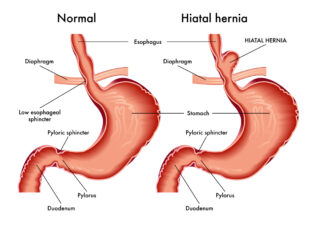
The Bariatric and Hernia Institute, PC – Greenbelt
7500 Greenway Center Drive
Suite #1120
Greenbelt, MD 20770
The Bariatric and Hernia Institute, PC – Silver Spring
10313 Georgia Avenue
Suite #307
Silver Spring, MD 20902

More Pain Management & Rehabilitation Articles
Hiatal Hernia: A Common Cause For Heartburn

What Is a Hiatal Hernia?
A hiatal hernia is a type of hernia that occurs when the stomach migrates from the abdominal cavity into the chest cavity through the diaphragm. Other organs may also migrate into the chest but most commonly it is the stomach that is involved. The stomach migrates through a natural opening in the diaphragm. The occurrence of a hiatal hernia may be precipitated by a weakness in the diaphragm and by factors that cause high pressure in the abdomen, eg., repeated straining, chronic coughing, obesity and pregnancy.
What Are the Symptom Of a Hiatal Hernia?
Many hiatal hernias have no symptoms. However, the most common symptom is heartburn. Other symptoms include acid taste in the mouth, regurgitation of food, choking sensation in the throat, coughing especially at night, or vague upper abdominal pain.
How Is a Hiatal Hernia Diagnosed?
Many hiatal hernias are found incidentally during investigation for another problem, eg., doing a CT scan for abdominal pain and finding a hiatal hernia. For the individual that has symptoms, a hiatal hernia may be diagnosed by an upper GI study or an endoscopy performed by a gastroenterologist.
What Is the Treatment For a Hiatal Hernia?
Treatment for a hiatal hernia is often focused on controlling the symptoms. Since the most common symptoms are related to acid reflux then treatment is often aimed at reducing episodes of acid reflux.
General measures involve eliminating any predisposing factors, avoiding spicy foods and other foods that contribute to acid reflux, avoiding alcohol and caffeine, avoiding large meals especially before going to bed, and sleeping with the head propped up on multiple pillows.
Medications used to control acid production in the stomach can manage the symptoms for many patients. Many of these medications are available over the counter while some require prescription.
Surgery is generally reserved for patients that have persistent symptoms unresponsive to general measures or medications. Surgery is aimed at taking the stomach out of the chest cavity and returning the stomach to its natural position in the abdominal cavity. The opening in the diaphragm that allowed the hernia to occur is closed to prevent the stomach from going back into the chest cavity. The stomach is frequently wrapped around the esophagus to help manage symptoms.
Discussing symptoms with your doctor is the first step to determine if a hiatal hernia may be present.
Other Articles You May Find of Interest...
- How to Promote Bone Fracture Healing? Tips for Faster Healing
- Managing Chronic Back and Neck Pain
- Pervasiveness Of Pain
- Effective Solutions for Lower Back Arthritis: Medial Branch Blocks and Radiofrequency Ablation
- Spinal Compression Fracture Treatment Options
- Hiatal Hernia: A Common Cause For Heartburn
- Prevent and Treat Osteoporosis

















